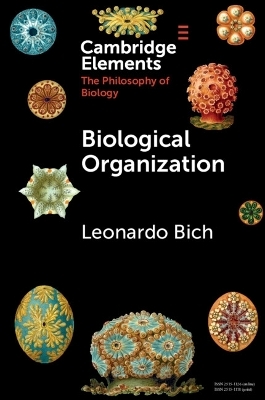
Biological Organization
Seiten
2025
Cambridge University Press (Verlag)
978-1-009-39396-6 (ISBN)
Cambridge University Press (Verlag)
978-1-009-39396-6 (ISBN)
- Lieferbar (Termin unbekannt)
- Portofrei ab CHF 40
- Auch auf Rechnung
- Artikel merken
The philosophical and theoretical approach discussed in this Element explains the properties of biological systems by appealing to their organization. It addresses classic and modern issues in the philosophy of biology, revises the conceptual foundations, and offers an updated version. This title is also available as Open Access on Cambridge Core.
Living systems are complex systems made of components that tend to degrade, but nonetheless they maintain themselves far from equilibrium. This requires living systems to extract energy and materials from the environment and use them to build and repair their parts by regulating their activities based on their internal and external conditions in ways that allow them to keep living. The philosophical and theoretical approach discussed in this Element aims to explain these features of biological systems by appealing to their organization. It addresses classical and more recent issues in philosophy of biology, fromorigins and definitions of life to biological teleology and functions, from an original perspective mainly focused on the living system, its physiology and behavior, rather than evolution. It discusses and revises the conceptual foundations of this approach and presents an updated version of it. This title is also available as Open Access on Cambridge Core.
Living systems are complex systems made of components that tend to degrade, but nonetheless they maintain themselves far from equilibrium. This requires living systems to extract energy and materials from the environment and use them to build and repair their parts by regulating their activities based on their internal and external conditions in ways that allow them to keep living. The philosophical and theoretical approach discussed in this Element aims to explain these features of biological systems by appealing to their organization. It addresses classical and more recent issues in philosophy of biology, fromorigins and definitions of life to biological teleology and functions, from an original perspective mainly focused on the living system, its physiology and behavior, rather than evolution. It discusses and revises the conceptual foundations of this approach and presents an updated version of it. This title is also available as Open Access on Cambridge Core.
1. Introduction: understanding what makes a system living; 2. Different uses of organization: organizational motifs, organizing principles, and the organizational framework; 3. Biological organization as a self-maintaining causal regime: from autopoiesis to closure of constraints; 4. Reinterpreting closure: from basic self-maintenance to regulatory control; 5. Naturalizing biological teleology and functions; 6. Interpreting biological phenomena through the lens of organization; 7. Bridging philosophical frameworks: organization and mechanisms; 8. Open challenges: symbiotic associations and the environment; References.
| Erscheinungsdatum | 24.12.2024 |
|---|---|
| Reihe/Serie | Elements in the Philosophy of Biology |
| Zusatzinfo | Worked examples or Exercises |
| Verlagsort | Cambridge |
| Sprache | englisch |
| Themenwelt | Naturwissenschaften ► Biologie ► Evolution |
| Naturwissenschaften ► Biologie ► Genetik / Molekularbiologie | |
| ISBN-10 | 1-009-39396-0 / 1009393960 |
| ISBN-13 | 978-1-009-39396-6 / 9781009393966 |
| Zustand | Neuware |
| Informationen gemäß Produktsicherheitsverordnung (GPSR) | |
| Haben Sie eine Frage zum Produkt? |
Mehr entdecken
aus dem Bereich
aus dem Bereich
Wie die Vernichtung der Arten unser Überleben bedroht - Der …
Buch | Softcover (2023)
Penguin (Verlag)
CHF 20,95


